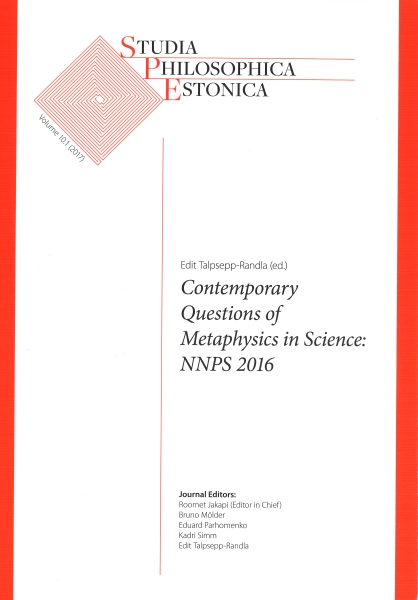Weyl's Conception of the Continuum in a Husserlian Transcendental Perspective
DOI:
https://doi.org/10.12697/spe.2017.10.1.07Keywords:
actual infinity, completed totality, continuous unity, intuitive continuum, individual, iteration principle, mathematical continuum, restriction principle, temporal consciousness, time-pointAbstract
This article attempts to broaden the phenomenologically motivated perspective of H. Weyl's Das Kontinuum (1918) in the hope of elucidating the differences between the intuitive and mathematical continuum and further providing a deeper phenomenological interpretation. It is known that Weyl sought to develop an arithmetically based theory of continuum with the reasoning that one should be based on the naturally accessible domain of natural numbers and on the classical first-order predicate calculus to found a theory of mathematical continuum free of impredicative circularities (such as the standard definition of the least upper bound of a set of real numbers) only to stumble, to cite a key question, in the evident lack of intuitive support for the notion of points of the continuum. In this motivation, I set out to deal from a Husserlian viewpoint with the general notion of points as appearances reducible to individuals of pre-predicative experience in contrast with the notion of an interval of real numbers taken as an abstraction based on the intuition of time-flowing experience. I argue that the notions of points and of real intervals in the above sense are not by essence related to objective temporality and thus their incompatibility in mathematical terms is ultimately due to deeper constituting reasons independently of any causal and spatio-temporal constraints.
References
Becker, O. (1914). Beiträge zur Phänomenologischen Begründung der Geometrie und ihrer physikalishen Anwendungen, Jahrbuch für Philosophie und Phänomenogische Forschung 6: 385-560.
Becker, O. (1927). Mathematische Existenz, Jahrbuch für Philosophie und Phänomenogische Forschung 8: 439-809.
Bernard, J. (2009). Notes on the first chapter of Das Kontinuum: Intension, Extension and Arithmetism, Philosophia Scientiae 13: 155-176.
Da Silva, J. J. (1997). Husserl's phenomenology and Weyl's predicativism, Synthese 110: 277-296.
Feferman, S. (1998). In the Light of Logic, Oxford University Press, Oxford.
Feferman, S. (2000). The significance of Weyl's ``Das Kontinuum'', in V. F. Hendricks, S. A. Pedersen & K. F. Jorgensen (eds), Proof Theory: History and Philosophical Significance, Kluwer, Dordrecht, pp. 179-194.
Feferman, S. (2009). Conceptions of the continuum, Intellectica 51: 169-189.
Feist, R. (2002). Weyl's appropriation of Husserl's and Poincar'e's thought, Synthese 132: 273-301.
Feist, R. (2004). Husserl and Weyl: Phenomenology, mathematics and physics, in R. Feist (ed.), Husserl and the Sciences, University of Ottawa Press, Ottawa, pp. 153-172.
Gödel, K. (1990). Collected Works II, Publications 1938-1974, Oxford University Press, Oxford. S. Feferman et al. (eds).
Husserl, E. (1929). Formale und Transzendentale Logik, Max Niemeyer Verlag, Halle.
Husserl, E. (1939). Erfahrung und Urteil, Acad./Verlagsbuchhandlung. hsgb. L. Langrebe.
Husserl, E. (1966). Vorlesungen zur Phänomenologie des inneren Zeibewusstseins, M. Nijhoff, Den Haag. hsgb. R. Boehm.
Husserl, E. (1970). Philosophie der Arithmetik, M. Nijhoff, Den Haag. hsgb. L. Eley.
Husserl, E. (1973). Ding und Raum, M. Nijhoff, Den Haag. hsgb. Claesges, U.
Husserl, E. (1976). Ideen zu einer reinen Phänomenologie und phänomenologischen Philosophie, Erstes Buch, M. Nijhoff, Den Haag.
Husserl, E. (1984). Logische Untersuchungen, M. Nijhoff, Den Haag. hsgb. U. Panzer.
Livadas, S. (2013). Are mathematical theories reducible to non-analytic foundations?, Axiomathes 23: 109-135.
Livadas, S. (2015). The subjective roots of forcing theory and their influence in independence results, Axiomathes 25: 433-455.
Livadas, S. (2017). What is the nature of mathematical-logical objects?, Axiomathes 27: 79-112.
Ryckman, T. & Mancosu, P. (2002). Mathematics and phenomenology. The correspondence between O. Becker and H. Weyl, Philosophia Mathematica 10: 130-202.
Ryckman, T. & Mancosu, P. (2005). Geometry, physics and phenomenology: The correspondence between O. Becker and H. Weyl, in V. Peckhaus (ed.), Die Philosophie und die Mathematik: Oskar Becker in der mathematischen Grundlagendiskussion, Wilhelm Fink Verlag, München, pp. 153-228.
Tieszen, R. (2011). After Gödel: Platonism and Rationalism in Mathematics and Logic, Oxford University Press, Oxford.
Toader, I. (2013a). Concept formation and scientific objectivity: Weyl's turn against Husserl, HOPOS: The jour. of the Intern. Soc. for the History of Philosophy of Science 3: 281-305.
Toader, I. (2013b). Why did Weyl think that formalism's victory against intuitionism entails a defeat of pure phenomenology?, History and Philosophy of Logic 35: 198-208.
Weyl, H. (1922). Space-Time-Matter, Dover Pub, New York. transl. Brose, H.
Weyl, H. (1994). The Continuum, Dover Pub, New York. transl. Pollard, S. and Bole T.





